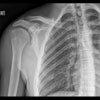Dear AuntMinnieEurope Member,
An incorrect or missing anatomical side marker on a knee x-ray can have severe consequences, and it might result in a lawsuit or even the death of a patient, as happened in Sweden.
News from Essen, Germany, about the successful use of artificial intelligence (AI) in this area is most welcome. The model is based on an off-the-shelf deep learning network, and it can help to prevent manual placement mistakes or missing side markers. Find out more in our AI Community.
Meanwhile, Danish researchers have found that a commercially available AI algorithm performed as well as radiologists in diagnosing the severity of knee osteoarthritis on x-rays. Their results support the use of the tool as a decision aid in daily clinical reporting.
In suspected cases of nonalcoholic fatty liver disease, what's the best technique for patients who have a problem holding their breath? MRI experts addressed this question in a new study and unveiled their findings on 21 March. Also, they've spoken about the work they'll be presenting at the annual congress of the International Society for Magnetic Resonance in Medicine, which takes place in London in May and will be covered by our editorial team.
A top priority for every MRI practitioner is the need to minimize the number of scan failures. A U.K. team has looked closely at this issue, particularly how scanner design, examination type, and patient age and gender can play a role in failed scans and what can be done to minimize claustrophobia-related issues with patients.
Over the past year or so, MRI has proved to be of great value in assessing the impact of long COVID-19 on the brain. Neuroscientists at the University of Oxford, U.K., have published new research in this area, and their analysis deserves a close look in our MRI Community.
Looking ahead, you can now register for our free webinar on thoracic AI, which takes place at 19:00 CET on Wednesday, 6 April. Expert speakers will include Prof. Mathias Prokop, PhD; Prof. Marie-Pierre Revel, PhD; and Imon Banerjee, PhD. It will last 60 minutes and include a live Q&A session. I urge you not to miss this event.



















